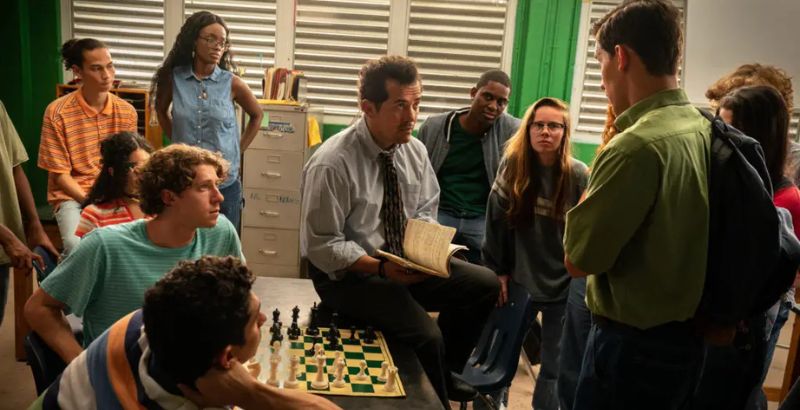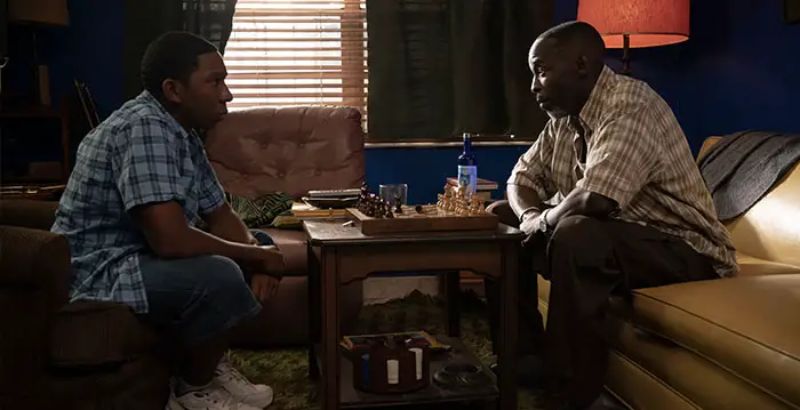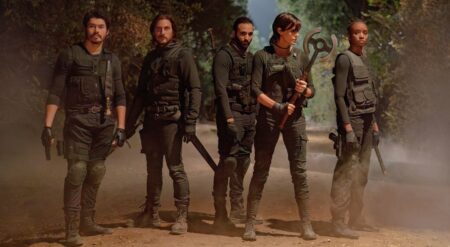
As John Leguizamo‘s directorial debut, Critical Thinking, is so much more than the genre of movie it exists in, instead it sets the foundation for the way that these stories should be told in the future. The film, based on a true story, takes place in 1998’s Miami where poverty, broken families, and a prejudiced system pushes underprivileged youth to the fringes of society. I know, we’ve heard this one before. A teacher comes in and changes their life, making them want an education over a life of crime. Only, that isn’t Critical Thinking.
Centered on a group of teens in Mr. “T” Martinez’s chess elective, these students are in an environment where they aren’t seen as bad, unintelligent, or just not worth it. Instead, the kids are competitive and present. This may not seem like a revolutionary act, but in a way, on film, it is. The kids in chess classes like Mr. T’s exist across every school and want to succeed in a world that doesn’t want them to. After a tragedy that has become all too common in their high school, Mr. T leads the kids to compete in the National Chess Championship. With an underfunded school district, their kids have to fight for their spot and respect in the arena.
In Critical Thinking, chess is shown as an equalizer, a game that only cares about how you play, not where you come from. Throughout the story, chess runs parallel to the kids’ experiences and Mr. T uses it to teach them that they can use the power they find while playing chess in the other places of their lives. My grandpa taught me the names of chess pieces when I was five and every year after that he taught me and more.
He used chess as an equalizer as in the film. He told me that unlike sports or life, chess didn’t care about how strong I was physically, if I was a girl, what part of town I was from, or anything else. I just had to use my mind. When my grandpa passed from Alzheimer’s disease, I looked back on how he used chess to teach me about life, and how it formed a lot of critical thinking skills.

Seeing this experience reflected in a group of kids who look like me, imbued with Leguizamo’s signature humor and heart, shook me. Critical Thinking takes the trappings of the drama and repurposes them. These kids have been through trauma, but it isn’t the focus of the film. Other films like Freedom Writers is focused on the pain of marginalized students, their trauma, and how one teacher (usually white) saves them from it. In contrast, Critical Thinking gives a story where the reality of pain is present, but the success of the teens is the focus as the overcome what’s stacked against them.
The cast of Critical Thinking is not just emotional but charismatic as well. The main players on the team, Sedrick (Corwin C. Tuggles), Ito (Jorge Lendeborg Jr.), Rodelay (Angel Bismark Curiel), and Gil (Will Hochman) have amazing chemistry together. More importantly, their relationship with Mr. T is believable and moving. Sedrick’s relationship with his dad is different than what we see normally, having lost his mom, the two argue, but they settle it through chess. Ito is under pressure to provide for his family, needing to find a perspective where he can both be a teen and take care of his home, resisting the call of violence in the neighborhood. Rodelay and Gil serve as comedic moments, leveling out the group. My only issue with the cast is, through no fault of Lendeborg, the real-life Ito was not light-skinned like the actor portraying him.
As their teacher, Leguizamo cares, feels, and is doing his best to not only teach chess but to push the kids for more by teaching them about life. Like Stand and Deliver before it, Mr. T is able to teach his kids about life because he’s lived it, he’s been in their shoes, and he knows how the world will look at them. In his words, “there is a rainbow of colors at this table, myself included, that need no help having the police come knock at our doors.”
Mr. T’s identity is central to the story because he isn’t trying to save his kids; he’s trying to wake them up and teach them about the world. The humor that he uses, from his teaching – akin to what is shown in Lequizamo’s one-man show Latin History for Dummies – to how he relates to and inspires the kids from his own experiences all work to create a believable and loving teacher. There is something about teachers who come from the backgrounds of the students they teach, they understand them in a different way, they push them in different ways, and they encourage them in a different way. That was what made Stand and Deliver a classic and a focal point of Chicano cinema and its what makes Critical Thinking so much more than a “save the poor kids” narrative.

This directly leads to moments in the film that hit hard and can serve as a lesson for viewers. When asked, “how come they always paint us out and rewrite us?” Mr. T responds, “dig deeper.” He explains how brown and Black people have been making history and how school boards continually write us out of it. He calls for his students to dig deeper, to look for more history if they don’t see people who look like them in the pages.
It’s a moment that happens quickly, but its one that I wish more teachers had said to students in my neighborhood.
But one of my favorite things about Critical Thinking is that it shows chess as an everyday game for folks in Miami and doesn’t treat it as unattainable for boys like the ones there. They’re all smart and capable, as are the communities they’re from. While some may miss the small shots of chess boards in barbershops and other places on the street and only take note of Domino Park, it wasn’t lost on me.
Critical Thinking is a phenomenal film that pushes past the genre’s tropes and showcases the reality of life for those of us who grew up and are growing up “bad neighborhoods.” And with that comes a couple of moments of shock and tragedy. But there is a triumph in this film too, and not in the way that others in the genre show. The kids find themselves and their power in chess to succeed because of their hardships, not in spite of them. I saw myself and my grandpa in this movie, and I can’t wait for others to watch it and see themselves too.
Critical Thinking was set to premiere at SXSW 2020 and is set for distribution later this year.
Critical Thinking
-
Rating - 9.5/109.5/10
TL;DR
Critical Thinking is a phenomenal film that pushes past the tropes of the genre and showcases the reality of life for those of us who grew up and are growing up “bad neighborhoods.”






